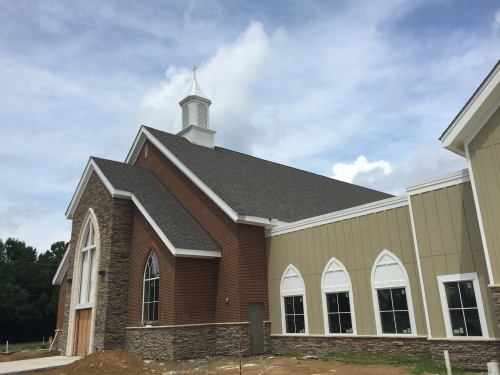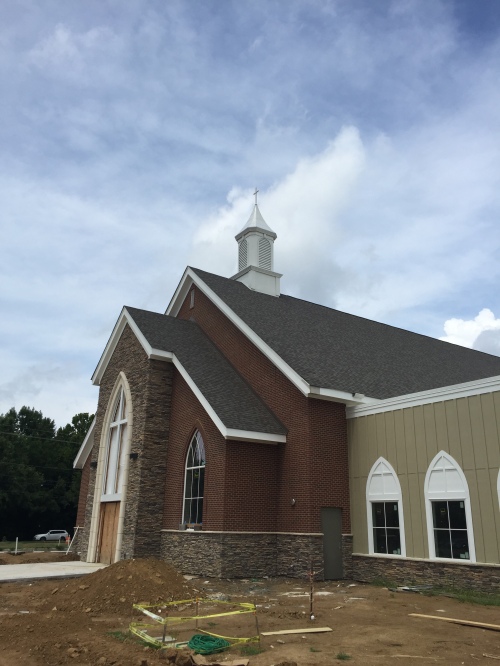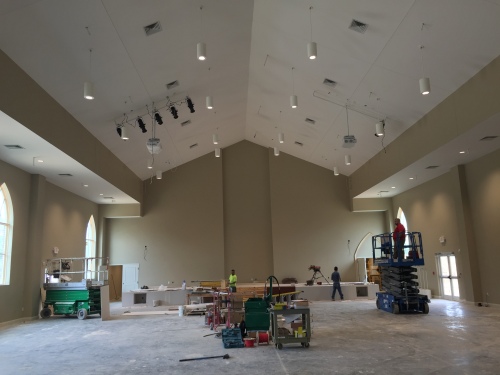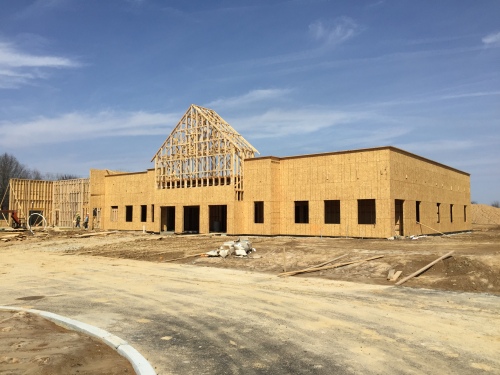It has been a long time since I have posted anything, that is about to change. Anyway, Brian Henson, my associate at St. Patrick wrote something w while back that was really good, so I asked his permission to post it here on my blog–enjoy!
My son, Joaquin, is at that age where he loves all things “superhero.” I can’t put into words how much fun it is to watch him running around the house and yard, doing battle against the forces of evil. At this stage of the game, that’s just who he is. In fact, a couple of months ago at his preschool, he and some of the other little boys were out on the playground playing—what else?—superheroes. As they played, they eventually got a little too rough, and the director of the school had to come have a talk with them about hitting, kicking, etc. When they got back to their classroom, Joaquin’s teacher talked to the boys about why they had been reprimanded, explaining to them that this sort of rough-housing wasn’t allowed on the playground, to which Joaquin replied, “But what about the bad guys?” That’s my boy.
For the last several months, hero #1 has been Steve Rogers, a.k.a., Captain America. He has asked to have his name changed to Steve Rogers, requests a Steve Rogers (i.e., short) haircut when his hair starts getting long, and carries his Captain America shield with him everywhere. His fascination with Steve Rogers started when he and I went to the Malco for some guy time. I knew Captain America would be a little scary in spots, but I also knew he’d love all the action. Not surprisingly, it’s now one of his favorite movies. If you haven’t seen the movie, I don’t want to spoil it for you, but I would like to uncover just a little of the plot. The bad guy in the movie, Johann Schmitt (known as Red Skull in the comic book world), is a high-ranking military official working for Hitler in Nazi Germany. He has been commissioned to do special weapons development in order to help the tilt the war in the favor of the Germans. However, as the movie progresses, it becomes clear that, in fact, he isn’t serving Germany at all. All his research, all his efforts, are bent upon building his own empire, his own name, his own glory. He is ostensibly serving one kingdom, one ruler, but he is, in fact, serving his own.
Though I can’t relate to much else that happens in Captain America, Schmitt’s intentions strike alarmingly close to home. No, I’m not bent on world domination (not most days, anyway). However, I too am a member of a kingdom—God’s Kingdom—and I have been commissioned with serving and living for that kingdom, and its king, Jesus. In this kingdom, my identity is based upon what God has done for me in sending Jesus to die for my sins. In this kingdom, my allegiance is to living a life of trust and love-motivated, grace-inspired obedience, for the glory of God and the joy of sinners like me. As we’ve said in our current sermon series on the Kingdom, it’s the place where the rule and reign of Jesus is realized in the hearts of his people.
But much of the time, I spend my time and efforts building and serving and living for the Kingdom of Me. In this kingdom, everything is ultimately about yours truly—my comfort, my desires, my priorities, my timetable, and my glory. Of course, my devotion to the Kingdom of Me isn’t quite as overt or dramatic as Schmitt’s was to his—after all, I don’t have cool lasers, a mountain fortress or any of the other requisite “bad guy” stuff we see in the movies—but it is still there, and its subtlety makes it all the more destructive.
Don’t get me wrong—I love being a part of God’s Kingdom, and look forward to the day when the Kingdom of Me will be put down once and for all. I am also grateful for the ways the Spirit has loosened my own kingdom’s grip on my heart in some important ways. But I’d be lying to myself, and to you, if I said the struggle wasn’t profound, intense, and frequent. I’ll bet you can relate. After all, there are as many “Kingdom of Me’s” as there are people in the world. Author Paul Tripp reflects upon this reality in his own life: “It took God employing hardship for me to embrace the inescapable reality that everything I did in ministry was done in allegiance to, or in pursuit of, the kingdom of self or the kingdom of God.” There it is: there are only two options. Live for myself, with me at the center of the universe, or live for Jesus, recognizing that he is on the throne where he belongs.
Since this is bound to be a struggle for everyone who belongs to Jesus, we need to ask an important question: How do I develop rhythms that the Spirit can use to give me a heart that longs to serve Jesus and his kingdom more, and me and my kingdom less? Here are a few practical suggestions, from one struggling Christian to another:
1.) Continue developing the habits of grace. Reading Scripture shows us objectively where our lives do and do not line up with God’s kingdom. Prayer has a way of showing us that life is bigger than we are, and that things aren’t all about us, particularly when we develop the discipline of praying for the needs of others. Worship is, by design, something that is not about us. Biblical worship focuses on who God is and what he has done. We are certainly addressed in worship, but it is not about us. That’s a death knell to the Kingdom of Me. It only works with big doses of pride. Worship drowns that out.
2.) Stay in Community. Do you have folks around you who love you enough to tell you when you’re out of line? Do you have relationships with believers who can cheer you on when they see that you are living for Jesus?
3.) Serve and practice hospitality. When we remember that we’re serving and showing hospitality to Jesus when we do that for others—especially those who can’t give us something back—God’s Kingdom is being honored, and the kingdom of Me, which focuses only on my agenda, is being starved.
4.) Remember the Gospel. This is the big one. In fact, it’s the engine that makes everything listed above effective. Paul Tripp puts it like this: “Could it be that this kingdom conflict is propelled and empowered by functional, personal gospel amnesia? When I forget what I’ve been given in Christ, I will tend to seek those things out of the situations, locations, and relationships of my [life]… The biggest protection against the kingdom of self is not a set of reformative defensive strategies. It’s a heart so blown away by the right-here, right-now glories of the grace of Jesus Christ that you’re not easily seduced by the lesser temporary glories of that claustrophobic kingdom of one, the kingdom of self.” In other words, it’s when we remember that God’s kingdom is built upon his unspeakable love given to us in Jesus that the Kingdom of Me doesn’t look quite so appealing.
Brian Henson is Associate Pastor at St. Patrick and as you see, he should be blogging himself!






